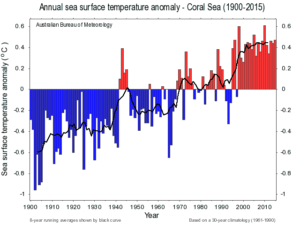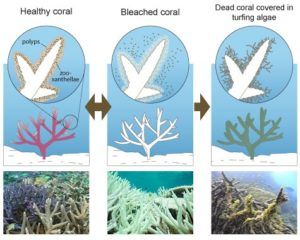The Great Barrier Reef Marine Park Authority – Climate Change, Coral Bleaching, and The End of Biodiversity

Is it too late to stop coral bleaching in Australia’s Great Barrier Reef? Can the Great Barrier Reef Marine Park Authority act now to ensure the long term survival of the reef?
The Great Barrier Reef and Coral Bleaching
In 1975, The Great Barrier Reef Marine Park Authority (GBRMPA) was established in order to manage the Great Barrier Reef on behalf of the Australian Government. The main purpose of the GBRMPA is to ensure the protection, sustainable use, and promote tourism of the Great Barrier Reef, as defined in their 2016 corporate filings1. The Great Barrier Reef contains the world’s largest coral reef ecosystem; it is also extremely vulnerable to climate change as manifested by rising water temperatures and ocean acidification2. In fact, during the summer of 2016, the worst ever recorded episode of mass coral bleaching occurred, directly coinciding with one of the warmest ocean temperatures ever recorded3.
Exhibit A – Australian Bureau of Metrology Ocean Surface Data in Great Barrier Reef Region
Coral bleaching occurs when water temperatures rise above 88 Fahrenheit for extended periods of time, causing the coral to expel the algae living on its surface, eventually leading to death of the coral polyp4. The loss of a large quantity of coral on the reef would be devastating to the thousands of species of fish and other animals living in this ecosystem, leading to a mass extinction and unrecoverable loss of biodiversity.
Exhibit B – Coral bleaching as explained on GBRMPA website
Tourism and Government Cover Ups
Aside from the importance of the reef as a biodiversity sanctuary, it is extremely important to the tourism industry in Australia, so much so that when a recent UN report on climate change mentioned the 2016 mass coral bleaching event, Australia’s Department of Environment moved to remove all mentions of Australia in the report, citing the negative impact it might have on tourism5. In the year ending June 2016, out of Australia’s 7.2 million yearly visitors, about 50% visited exclusively on holiday, and collectively spent around 15.9 Billion AUD6, equivalent to more than 1% of the country’s GDP. Furthermore, surveys conducted by the Australian government’s tourism research agency as recently as February 2016 indicate that out of the top ten tourist attractions, six are aquatic and coastal offerings, with The Great Barrier Reef, Wildlife, Unspoiled Natural Wilderness, and Beaches holding the top four spots7. Clearly, global warming can potentially affect GBRMPA’s ability to protect the reef, and attract tourism essential to Australia’s economy. As fewer areas of the park remain attractive, it is reasonable to believe that there will be added pressure from the tourism industry on the surviving areas. This added pressure combined with rising water temperatures could lead to the worst-case scenario of losing the Great Barrier Reef forever.
Action Plan – Too Little Too Late?
In 2007, the GBRMPA released a report titled “Climate Change Action Plan 2007 – 2012”8, which outlines specific initiatives aimed at mitigating the effects of climate change on the reef. These initiatives included performing more robust science through university partnerships, increasing the frequency and precision of the coral health monitoring, and reducing other pressures to the coral such as contaminated water, fishing and irresponsible tourism operators. The report also mentions working with broader government organizations to try to reduce the climate footprint. Unfortunately, as evidenced by the disastrous 2016 bleaching event, none of these initiatives were effective when the water temperatures continued to rise. A more comprehensive, worldwide plan is needed to normalize the temperature of the planet’s oceans. Sadly, at the current rate, it is possible that total extinction will occur over the next few decades.
Taking Extreme Measures
In my opinion, the GBRMPA should consider more extreme measures within its control in order to make this issue more publicly visible, and hopefully apply more pressure to governments and policy-makers worldwide. Every one of the millions of tourist that visit the Great Barrier Reef every year should be shown a dead, bleached reef, and educated on the causes of coral bleaching and other effects of climate change on the reef’s ecosystems. The hope is that this somber experience might compel some people enough to at least attempt to change their behavior when they return to their own countries, lest they play a part in killing the reef. If enough people care about this issue and pressure governments to act, it is possible to make a difference and save the Great Barrier Reef before it is too late.
[Word Count 712]
References
[1] Great Barrier Reef Marine Park Authority Corporate Plan 2016 – PDF [link] Accessed 11/2016.
[2] www.GBRMPA.gov.au – threats to the reef – climate change. Website [link] Accessed 11/2016.
[3] Cressey, D. (2016). Coral Crisis – Great Barrier Reef Bleaching Is The Worst We’ve Ever Seen. Nature, News Q&A. [link] Accessed 11/2016.
[4] McCalman, I. (2013). The Reef: A Passionate History. Macmillan. p.271.
[5] The Guardian – Australia scrubbed from UN climate change report after government intervention. Website [link] Accessed 11/2016.
[6] Tourism Research Australia – International Visitor Survey Results 2016. Excel File [link] Accessed 11/2016.
[7] Tourism Australia – Aquatic and Coastal Experiences Infographic. PDF [link] Accessed 11/2016.
[8] GBRMPA Climate Change Action Plan 2007 – 2012. PDF [link] Accessed 11/2016.
[Exhibit A] Australian Bureau of Metrology Ocean Surface Data in Great Barrier Reef Region. Chart [link] Accessed 11/2016.
[Exhibit B] GBRMPA – What is Coral Bleaching? JPG [link] Accessed 11/2016.





This is very sad, Javi. I knew that climate change was having serious ecological impact but what saddens me is how the Australian government did a cover up. It makes the trade off between short term cost and long term value really stark, and if a country which is supposed to be one of the leaders of today’s free world makes such a pathetic decision, it makes you wonder what some of other nations that are known to not care much about the environment will do.
An interesting parallel that one can draw is to historical monuments, which face the same trade off between short term cost and long term value. Interestingly though, governments do seem to be cognizant of that. For example, take a look at this article -http://en.people.cn/90001/90782/6699745.html – which talks about India taking proactive steps to protect its historic monuments, even though I’m sure it came at a high cost. I think that if the citizens of a country start attaching national value / pride to natural wonders, as much as they do to man made things, perhaps the government too will be more open to considering a proactive measure in taking care and planning in advance to deal with climate change’s impact to these natural features.
Thanks for your comment Saurav! I was really surprised when I read the article that talks about the government stepping in to block the UN report. The short term cost / long term value trade off is a difficult one, I think governments need to find a way to better balance incentives so that this type of trade off is not so difficult to justify from a budget perspective…
Thanks for writing about the GBR, Javi! Having grown up in Queensland, and visiting the reef over the last twenty years, it makes me sad seeing the gradual destruction of the reef and very conflicted over what the correct ‘next steps’ are to protect the reef.
I want to address the point that Saurav raised about pride and ownership – I can state definitively that Australians are concerned and proud of this great natural wonder that we have custody over, but the fact is that it contributes so significantly to our economy that it would not be feasible to limit all reef activity.
The contribution of the Reef to Queensland’s (and indeed, Australia’s) economy cannot be understated. For the Tropical North Queensland region, tourism accounts 91% and 93% of the region’s value-added and employment contributions to Australia respectively. [1] The region has been also hurting from other macroeconomic factors; the high Australian dollar has led to a recent slowdown in tourists from Asia. Limiting access to the reef would exacerbate this even more.
I am not sure what the correct next steps are – and I do not condone our previous government’s action in censoring this dialog, but it is a complex debate with very real economic factors in play. I just hope that it isn’t too late to save the Reef.
[1] https://www.environment.gov.au/system/files/resources/a3ef2e3f-37fc-4c6f-ab1b-3b54ffc3f449/files/gbr-economic-contribution.pdf
Javi, this is a great post. Thanks for highlighting the all too common tension between economic and environmental factors and the role that short versus long term tradeoffs play in trying to “thread the needle” so to speak when it comes to managing all aspects of this challenging problem.
Economic versus environmental tensions aside, I recently ran across an interesting piece of research that suggest that biodiversity can actually forestall the impact of climate change on a marine ecosystem! In fact, “communities with more fish species are more productive and more resilient to rising temperatures and temperature swings, according to a new study from the Smithsonian’s Tennenbaum Marine Observatories Network and other international institutions.” [1] Talk about a major downward spiral. Not only does climate change lead to a reduction in biodiversity, but the decrease in biodiversity can actually make the impact of climate change on the remaining ecosystem greater. It’d be interesting to know if the Australian government is pursuing any strategies to spur increases in biodiversity, which would have the dual impact of creating a more vibrant, interesting environment for tourists, as well as create some buffers for the populations that inhabit the reef.
[1] http://newsdesk.si.edu/releases/biodiversity-protects-fish-climate-change